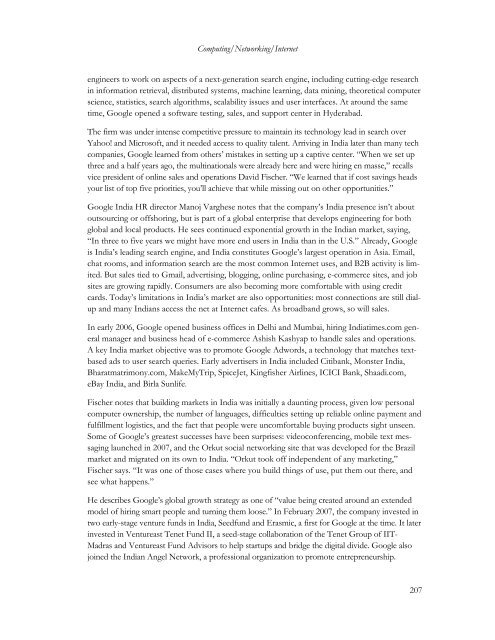PDF: 2962 pages, 5.2 MB - Bay Area Council Economic Institute
PDF: 2962 pages, 5.2 MB - Bay Area Council Economic Institute
PDF: 2962 pages, 5.2 MB - Bay Area Council Economic Institute
You also want an ePaper? Increase the reach of your titles
YUMPU automatically turns print PDFs into web optimized ePapers that Google loves.
Computing/Networking/Internet<br />
engineers to work on aspects of a next-generation search engine, including cutting-edge research<br />
in information retrieval, distributed systems, machine learning, data mining, theoretical computer<br />
science, statistics, search algorithms, scalability issues and user interfaces. At around the same<br />
time, Google opened a software testing, sales, and support center in Hyderabad.<br />
The firm was under intense competitive pressure to maintain its technology lead in search over<br />
Yahoo! and Microsoft, and it needed access to quality talent. Arriving in India later than many tech<br />
companies, Google learned from others’ mistakes in setting up a captive center. “When we set up<br />
three and a half years ago, the multinationals were already here and were hiring en masse,” recalls<br />
vice president of online sales and operations David Fischer. “We learned that if cost savings heads<br />
your list of top five priorities, you’ll achieve that while missing out on other opportunities.”<br />
Google India HR director Manoj Varghese notes that the company’s India presence isn’t about<br />
outsourcing or offshoring, but is part of a global enterprise that develops engineering for both<br />
global and local products. He sees continued exponential growth in the Indian market, saying,<br />
“In three to five years we might have more end users in India than in the U.S.” Already, Google<br />
is India’s leading search engine, and India constitutes Google’s largest operation in Asia. Email,<br />
chat rooms, and information search are the most common Internet uses, and B2B activity is limited.<br />
But sales tied to Gmail, advertising, blogging, online purchasing, e-commerce sites, and job<br />
sites are growing rapidly. Consumers are also becoming more comfortable with using credit<br />
cards. Today’s limitations in India’s market are also opportunities: most connections are still dialup<br />
and many Indians access the net at Internet cafes. As broadband grows, so will sales.<br />
In early 2006, Google opened business offices in Delhi and Mumbai, hiring Indiatimes.com general<br />
manager and business head of e-commerce Ashish Kashyap to handle sales and operations.<br />
A key India market objective was to promote Google Adwords, a technology that matches textbased<br />
ads to user search queries. Early advertisers in India included Citibank, Monster India,<br />
Bharatmatrimony.com, MakeMyTrip, SpiceJet, Kingfisher Airlines, ICICI Bank, Shaadi.com,<br />
e<strong>Bay</strong> India, and Birla Sunlife.<br />
Fischer notes that building markets in India was initially a daunting process, given low personal<br />
computer ownership, the number of languages, difficulties setting up reliable online payment and<br />
fulfillment logistics, and the fact that people were uncomfortable buying products sight unseen.<br />
Some of Google’s greatest successes have been surprises: videoconferencing, mobile text messaging<br />
launched in 2007, and the Orkut social networking site that was developed for the Brazil<br />
market and migrated on its own to India. “Orkut took off independent of any marketing,”<br />
Fischer says. “It was one of those cases where you build things of use, put them out there, and<br />
see what happens.”<br />
He describes Google’s global growth strategy as one of “value being created around an extended<br />
model of hiring smart people and turning them loose.” In February 2007, the company invested in<br />
two early-stage venture funds in India, Seedfund and Erasmic, a first for Google at the time. It later<br />
invested in Ventureast Tenet Fund II, a seed-stage collaboration of the Tenet Group of IIT-<br />
Madras and Ventureast Fund Advisors to help startups and bridge the digital divide. Google also<br />
joined the Indian Angel Network, a professional organization to promote entrepreneurship.<br />
207








